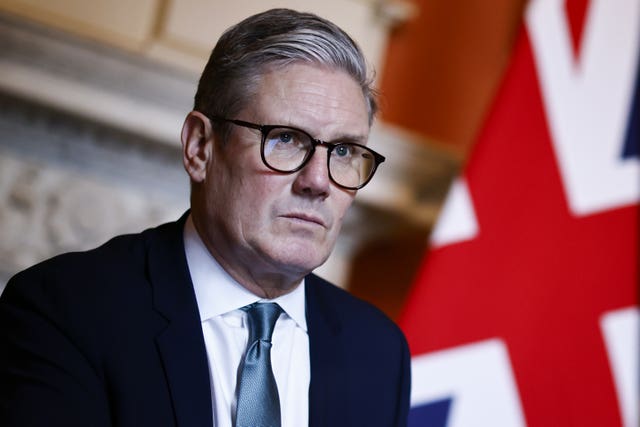Sir Keir Starmer has insisted an immediate ceasefire is required in Gaza, as he warned the “world will not look away” from the suffering faced by “innocent civilians”.
The Prime Minister made clear the UK Government’s policy includes securing the release of hostages from Gaza and a “huge” increase of humanitarian assistance, noting a ceasefire is the “only way” to achieve it.
Israel and the Palestinians must also recommit to “stability, peace and normalisation and the two-state solution”, Sir Keir added.

They were made against the backdrop of Labour MPs tabling a King’s Speech amendment calling for the UK Government to support an immediate ceasefire in the Israel-Hamas conflict and to suspend export licences for arms transfers to Israel.
Speaking in the Commons, Sir Keir outlined the details of his talks with the leaders of Israel and the Palestinian Authority.
He said: “I’ve been clear that I fully support Israel’s right to security, the desperate need to see the hostages returned and I’ve also been clear that the situation in Gaza is intolerable and that the world will not look away as innocent civilians – including women and children – continue to face death, disease and displacement.
“It cannot go on, we need an immediate ceasefire, hostages out, aid in, a huge scale-up of humanitarian assistance. That is the policy of this Government and an immediate ceasefire is the only way to achieve it. So we will do all we can in pursuit of these goals.”
Sir Keir said this is why the Government has restarted UK funding to the United Nations Relief and Works Agency (Unrwa), adding: “We’ve received the ICJ (International Court of Justice) opinion on Friday and we’ll consider it carefully before responding.
“But let me say that we’ve also always been opposed to the expansion of illegal settlements and we call on sides to recommit to stability, peace and normalisation and the two-state solution – a recognised Palestinian state, the right of the Palestinian people, alongside a safe and secure Israel.
He said: “This issue has now become a crisis and to tackle it we must reach out the hand to our European friends.
“We started that work at the EPC, agreeing new arrangements with Slovenia and Slovakia, deepening co-operation across Europe for our new border security command, and increasing the UK presence at Europol in The Hague to play our full part in the European migrant smuggling centre.
“The crisis we face is the fault of gangs, no question. But to stop illegal migration we must also recognise the root causes – conflict, climate change and extreme poverty.”
Sir Keir said he had announced £84 million for projects across Africa and the Middle East, adding: “We will work with our partners to stamp out this vile trade wherever it exists, focus on the hard yards of law enforcement with solutions that will actually deliver results.”
He added: “Let me be clear: there is no need to withdraw from the European Convention on Human Rights. That is not consistent with the values of that blood bond (of 1945) and so we won’t withdraw, not now, not ever.
“Because the basic fact is the priorities of the British people do require us to work across borders with our partners and a Government of service at home requires a Government of strength abroad – that is our role, it’s always been our role, Britain belongs on the world stage.”
At one stage, Sir Keir mistakenly called Rishi Sunak the prime minister during their exchange.
Sir Keir’s slip of the tongue came as Conservative Party leader Mr Sunak urged him to keep migration partnerships with third countries – such as the one he struck with Rwanda – “on the table”.
Mr Sunak said: “When it comes to illegal migration, we all face the same fundamental question: how to deal with people who come to our countries illegally, whilst respecting our international obligations. Because of course, it’s not feasible or right to return Afghans to the Taliban, or Syrians to Assad or Iranians to the ayatollahs.”
He added: “I would urge him in his conversations with other European leaders to keep the option of further third country migration partnerships on the table as other countries have been discussing.”






